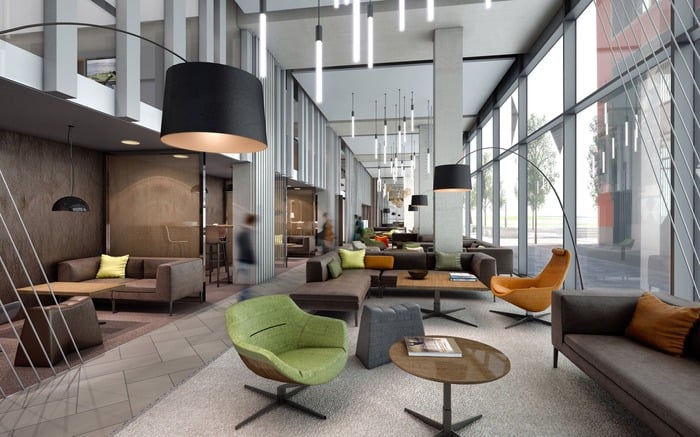The evolution of technology has transformed every facet of our lives, and the realm of student accommodation is no exception. Traditional dormitories and apartments are giving way to smart, modern living spaces that integrate cutting-edge technology to enhance convenience, safety, and overall quality of life for students. In this article, we will explore the significant role that smart technology plays in modern student accommodation.
Enhanced Security
In the context of students residing away from their familiar homes, paramount attention is directed toward their safety and security. This concern has been met with a revolutionary transformation, courtesy of smart technology, particularly within the confines of student accommodations. The integration of keyless entry systems, biometric access control mechanisms, and sophisticated video surveillance setups has ushered in a new era of security enhancements. These advanced features collectively contribute to an augmented security paradigm that resonates strongly with the well-being of the students.
These types of tech-filled properties are more and more popular all over the country, from Perth all the way to Brisbane, as can be seen when searching through listings on online tools. Not only do they set themselves out from the competition, but they can also be listed for a higher price. To see this, all you must do is filter by price on the property portals like Rentola and see the difference. This is an easy way to use these websites to your advantage when searching for a place.
The advent of keyless entry systems, a hallmark of smart technology, has redefined the very process of accessing living quarters. This evolution replaces the traditional lock-and-key model with a seamless interface that aligns with contemporary sensibilities. Such systems employ cutting-edge authentication methods, like biometric access control, which recognize individual physiological attributes. Consequently, students can access their designated living spaces securely, alleviating concerns of unauthorized entry.
The introduction of video surveillance, an integral facet of smart security, further amplifies the protective measures within student accommodations. Real-time monitoring of communal areas empowers students to oversee their surroundings and report any anomalies promptly. This capability serves not only as a deterrent against potential security breaches but also as a means to cultivate an environment of vigilance and accountability.
Energy Efficiency
The integration of smart technology into the fabric of modern living spaces has brought about a significant paradigm shift, particularly in the realm of energy conservation. With a focus on sustainability and operational efficiency, smart technology’s impact on heating, cooling, and lighting systems has been transformative.
The cornerstone of this transformation is the Internet of Things (IoT), an interconnected network of devices that communicate and collaborate seamlessly. Within student accommodations, IoT sensors play a pivotal role in regulating environmental conditions intelligently. By analyzing occupancy patterns and real-time weather data, these sensors dynamically adjust room temperatures. This nuanced approach ensures that energy consumption aligns precisely with the requirements, thereby curbing unnecessary energy wastage. The outcome is a living environment that is not just comfortable but also attuned to the principles of responsible energy usage.
The spectrum of energy optimization extends to lighting systems, a facet that often goes unnoticed yet profoundly impacts energy expenditure. Smart technology addresses this by instituting automated lighting systems that respond to occupancy. When a room is unoccupied, these systems autonomously switch off the lights, mitigating the inadvertent waste of energy. This responsive approach is seamlessly integrated into the routines of residents, further reinforcing the notion of sustainable practices as a part of daily life.
Smart Appliances
In the ever-evolving landscape of student accommodations, the infusion of smart appliances has led to a profound reimagining of daily routines, elevating ordinary tasks to the realm of seamless and efficient experiences. This transformative integration, marked by the convergence of technology and utility, encompasses an array of facets, each contributing to a more streamlined and convenient living environment for students.
At the forefront of this transformation stand smart thermostats and smart meters, which usher in a new era of energy management within student accommodations. These devices, driven by cutting-edge technology, provide residents with a granular level of insight into their energy consumption patterns. By facilitating real-time monitoring and control of energy usage, they empower students to take charge of their resource consumption, fostering informed decisions that align with both economic and environmental considerations. This ability to gauge and regulate energy consumption instills a sense of responsibility, laying the groundwork for a more sustainable lifestyle.
Venturing into the domain of daily chores, the integration of smart technology extends its convenience to the realms of kitchen and laundry facilities. Smart kitchen appliances, equipped with intuitive sensors and interfaces, redefine culinary endeavors. These appliances not only streamline the cooking process but also optimize resource utilization. Furthermore, the ability to interact with these appliances remotely, via smartphone applications, ensures that students can orchestrate their culinary endeavors with unprecedented flexibility.
The role of smart technology in modern student accommodation cannot be overstated. It has transformed these spaces into vibrant, secure, and connected communities that cater to the evolving needs of students. By enhancing security, promoting energy efficiency, facilitating connectivity, and providing personalized experiences, smart technology has reshaped the way students live and interact within their accommodations. As technology continues to advance, we can expect even more innovative solutions that further elevate the student living experience.

